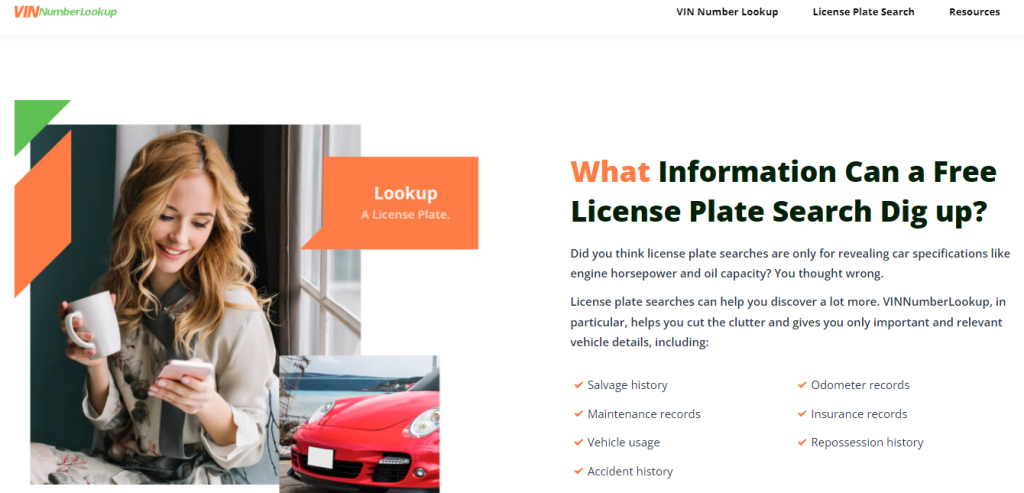Maybe you don’t want to risk buying a used car with hidden problems and hefty repair costs down the line. Or you’re just curious about the value of your vehicle. Regardless, accessing information about a vehicle’s history can be incredibly valuable.
However, you can try to decode your VIN for free with online decoders like VINNumberLookup to learn about a car’s history, or you can count on its license plate lookup service. The latter one allows you to obtain information about a vehicle’s past and present simply by searching its license plate number.
In this article, we’ll explore the process of performing a license plate lookup, the types of information you can obtain, and the legal considerations to keep in mind. Whether you’re a car buyer, owner, or just curious, read more about this valuable service.
Why Use a License Plate Lookup?
Performing a license plate lookup can be useful for a variety of reasons. For example, people should check the history of a used car before purchasing it to ensure that it has not been involved in any major accidents or has any outstanding liens. Additionally, law enforcement agencies can use license plate lookups to track down hit-and-run drivers, identify stolen vehicles, or investigate other types of crimes involving a vehicle.
Using the service of license plate lookup, you can make more informed decisions about vehicle purchases, track down hit-and-run drivers, and gather important information for investigations.
How Does a License Plate Lookup Work?

Performing a license plate lookup usually involves searching a database of DMV records using the license plate number as the search key. Several websites offer this service, including VINNumberLookup, which provides a free license plate lookup service.
To look up a license plate number with VINNumberLookup, you can access information about a car like salvage history, odometer records, insurance records, vehicle usage, repossession history, and so on.
To perform a license plate lookup, enter the license plate number into the search bar and hit the “search” button. The website then queries the database for any information associated with that license plate number and returns the results to the user.
Some websites may require users to provide additional information, such as the state where the license plate is registered, to perform a more accurate search. It’s important to note that the information returned by a license plate lookup may vary depending on the state where the vehicle is registered, as some states have stricter privacy laws restricting the amount of information that can be shared.
The information obtained through a license plate lookup includes the vehicle make and model, registration status, owner’s name and address, and any accident or ticket history associated with the vehicle. Depending on the website used, users may also view photos of the vehicle and any liens or other financial obligations associated with the vehicle.

Legal Considerations about License Plate Number Check
While a license plate lookup can be useful for obtaining important information about a vehicle, it’s important to consider the potential legal implications of performing one. DMV records are highly regulated in some states, and accessing this information without proper authorization can result in legal consequences. That is why it is important to use a platform with legal backup like VINNumberLookup.
Additionally, responsibly and ethically using the information obtained through a license plate lookup is important. Using this information for illegal or unethical purposes, such as stalking or harassment, can result in serious legal consequences, including fines and imprisonment.
Furthermore, there are limits to the amount and types of information you can obtain through a license plate lookup. The availability of this information may vary depending on the state in which the vehicle is registered. It’s crucial to understand the laws in your state regarding license plate lookups and to use these services responsibly to avoid legal consequences.
Tools And Resources For Performing a License Plate Lookup
Several websites and apps offer license plate lookup services with unique features, pricing, and limitations. Some popular options include VINNumberLookup, AutoCheck, and Carfax.
VINNumberLookup is a free license plate lookup service that provides access to information related to the vehicle’s make and model, registration status, owner’s name and address, and any accident or ticket history associated with the vehicle. AutoCheck and Carfax, on the other hand, are subscription-based services that provide more detailed reports, including information about the vehicle’s maintenance history, previous owners, and any liens or recalls associated with the vehicle.
While using these tools can be convenient and cost-effective, it’s important to consider their limitations. The information provided through a license plate lookup may not be entirely up to date, and the availability of information may vary depending on the state in which the vehicle is registered.
Hiring a private investigator or conducting the search through official DMV channels may provide more reliable and comprehensive information but can be much more expensive and time-consuming. That is why it is recommended to perform your license plate lookup through VINNumberLookup, as it is free and very fast to use.
Conclusion
License plate lookup on VINNumberLookup is useful for anyone seeking information about a vehicle, its history, and its current status. Performing a license plate lookup typically involves searching a database of DMV records using the license plate number as the search key.
Through a license plate lookup, one can obtain information such as the vehicle make and model, registration status, owner’s name and address, and any accident or ticket history associated with the vehicle. These tools can be convenient and cost-effective, but it’s important to consider their limitations and use them responsibly and ethically.
It’s also essential to understand the legal considerations surrounding license plate lookups, as some states have laws governing who can access DMV records and what information can be obtained. Moreover, it’s crucial to use the information obtained through a license plate lookup only for legal and ethical purposes and not for illegal or unethical activities.



